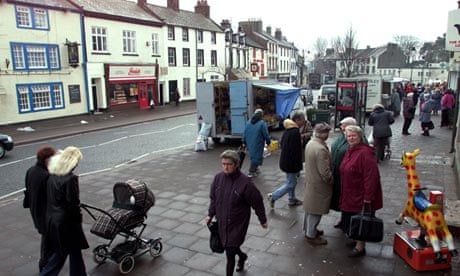Many aspiring homeowners feel like they have to "win the lottery" to buy a house, as the price of the average property in England has soared by more than three times the rate of average salaries over a decade, according to a report.
In 2001 the average price of a home in England was £121,769, and the average salary was £16,557. In 2011 the price of the average home was £236,518 – an increase of 94% – while wages had risen by just 29% to £21,330, the National Housing Federation said.
The disparity is even greater in some areas. People living in Copeland in the Lake District, where according to the local borough council about 50% of the working population is employed by the Sellafield nuclear power plant or reliant on it for related employment, have seen the biggest increase in the gap between average house prices and wages: house prices have risen by 145% and incomes by just 5% over the past 10 years.
In Watford the average house price is up 76% to £246,455, while the average salary has fallen by 13% to £15,272, and in Corby in Northamptonshire the gap has also widened markedly. There, the average house price has more than doubled from £60,594 to £132,381, while a local salary has increased only marginally from about £17,000 to £18,522.
Across the country, those who earn enough to buy a house will have to put down a far bigger percentage of the property price than they did in 2001.
In 2001 the deposit for a typical 90% mortgage was £12,177, about nine months' salary, according to the NHF, which has compiled its data from Land Registry and ONS figures. Now, because banks and building societies have tightened their lending criteria, a buyer can typically expect to put down a 25% deposit at £59,129, almost three years salary. For someone in Copeland, this means they would now typically have to find a deposit of more than £32,000 compared to the £5,000 they could have put down in 2001.
David Orr, chief executive of the NHF, said: "With the gap between income and house prices growing ever wider, people can often feel like they have to win the lottery to be able to buy in their local area.
"A shortage of homes means the price to buy them is being pushed ever higher by the market, and out of reach of millions of hard working families. Unless we start building more homes people can truly afford to match the demand, this will only get worse."
Last Thursday, figures released by the government showed that the number of new house builds started in the three months between April and June this year was at a three-year low.
Commenting on the NHF report, housing minister Grant Shapps said: "We are pulling out all the stops to help people across the country realise their dream of homeownership. We've introduced the NewBuy Guarantee, enabling aspiring homeowners to buy with just a fraction of the deposit they would normally require; the FirstBuy scheme, offering a valuable alternative to the bank of mum and dad; and Funding for Lending, to make mortgages cheaper and easier to get."
The problem of saving for a deposit while renting was highlighted by a separate report from LSL property services, which owns estate agency chains such as Your Move and Reeds Rains, showing that rents in England and Wales reached a record high in July.
Tenants are now paying an average of £725 a month, 2.9% more than in July 2011.
In response to LSL's research, the head of Britain's biggest housing charity, Shelter, said "out of control" rents were having a devastating impact on ordinary families who are having to cut back on food and other essentials.

Comments (…)
Sign in or create your Guardian account to join the discussion